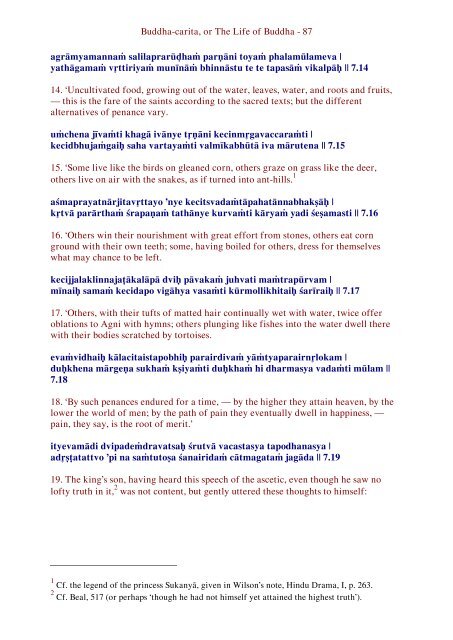The Buddha-Carita or The Life of Buddha by Ven. Aśvaghoṣa
A Sanskrit and English line by line (interlinear) version of one of the most important and influential biographies of the Buddha (together with extensive annotation).
A Sanskrit and English line by line (interlinear) version of one of the most important and influential biographies of the Buddha (together with extensive annotation).
You also want an ePaper? Increase the reach of your titles
YUMPU automatically turns print PDFs into web optimized ePapers that Google loves.
<strong>Buddha</strong>-carita, <strong>or</strong> <strong>The</strong> <strong>Life</strong> <strong>of</strong> <strong>Buddha</strong> - 87<br />
agrāmyamanna salilaprarūḍha parṇāni toya phalamūlameva |<br />
yathāgama vttiriya munīnā bhinnāstu te te tapasā vikalpāḥ || 7.14<br />
14. ‘Uncultivated food, growing out <strong>of</strong> the water, leaves, water, and roots and fruits,<br />
— this is the fare <strong>of</strong> the saints acc<strong>or</strong>ding to the sacred texts; but the different<br />
alternatives <strong>of</strong> penance vary.<br />
uchena jīvati khagā ivānye tṇāni kecinmgavaccarati |<br />
kecidbhujagaiḥ saha vartayati valmīkabhūtā iva mārutena || 7.15<br />
15. ‘Some live like the birds on gleaned c<strong>or</strong>n, others graze on grass like the deer,<br />
others live on air with the snakes, as if turned into ant-hills. 1<br />
aśmaprayatnārjitavttayo ’nye kecitsvadatāpahatānnabhakṣāḥ |<br />
ktvā parārtha śrapaṇa tathānye kurvati kārya yadi śeṣamasti || 7.16<br />
16. ‘Others win their nourishment with great eff<strong>or</strong>t from stones, others eat c<strong>or</strong>n<br />
ground with their own teeth; some, having boiled f<strong>or</strong> others, dress f<strong>or</strong> themselves<br />
what may chance to be left.<br />
kecijjalaklinnajaṭākalāpā dviḥ pāvaka juhvati matrapūrvam |<br />
mīnaiḥ sama kecidapo vigāhya vasati kūrmollikhitaiḥ śarīraiḥ || 7.17<br />
17. ‘Others, with their tufts <strong>of</strong> matted hair continually wet with water, twice <strong>of</strong>fer<br />
oblations to Agni with hymns; others plunging like fishes into the water dwell there<br />
with their bodies scratched <strong>by</strong> t<strong>or</strong>toises.<br />
evavidhaiḥ kālacitaistapobhiḥ parairdiva yātyaparairnlokam |<br />
duḥkhena mārgeṇa sukha kṣiyati duḥkha hi dharmasya vadati mūlam ||<br />
7.18<br />
18. ‘By such penances endured f<strong>or</strong> a time, — <strong>by</strong> the higher they attain heaven, <strong>by</strong> the<br />
lower the w<strong>or</strong>ld <strong>of</strong> men; <strong>by</strong> the path <strong>of</strong> pain they eventually dwell in happiness, —<br />
pain, they say, is the root <strong>of</strong> merit.’<br />
ityevamādi dvipadedravatsaḥ śrutvā vacastasya tapodhanasya |<br />
adṣṭatattvo ’pi na satutoṣa śanairida cātmagata jagāda || 7.19<br />
19. <strong>The</strong> king’s son, having heard this speech <strong>of</strong> the ascetic, even though he saw no<br />
l<strong>of</strong>ty truth in it, 2 was not content, but gently uttered these thoughts to himself:<br />
1 Cf. the legend <strong>of</strong> the princess Sukanyā, given in Wilson’s note, Hindu Drama, I, p. 263.<br />
2 Cf. Beal, 517 (<strong>or</strong> perhaps ‘though he had not himself yet attained the highest truth’).


















